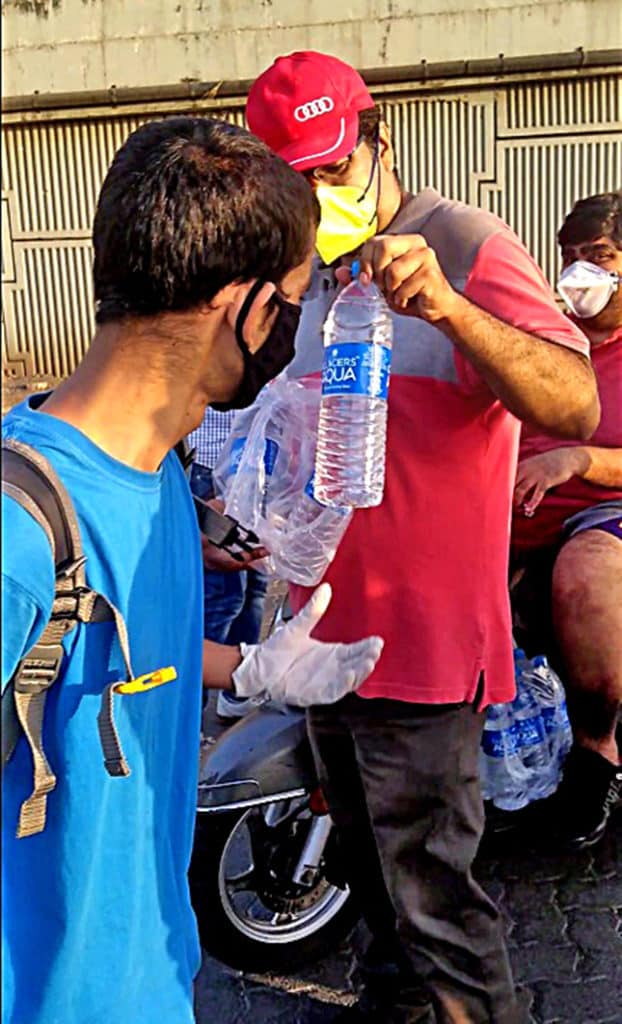In many communities, the pandemic brought about a desperate need for a resource essential to survival: clean drinking water.
Mumbai-based volunteers from the Ismaili Civic, a wider movement run by the Ismaili Muslim community globally, played a crucial role in the city by delivering water during the pandemic, earning praise both from doctors and the state government.
In early June 2020, they began distributing clean drinking water to COVID19 centres, first to larger hospitals and then to smaller ones (which had cropped up due to increasing cases), continuing through the deadly second wave, supplying close to 40,000 litres of water in the months of March, April and May of 2021 alone. “There was shortage especially in the smaller centers,” said Akbar Merchant, Assistant Editor Autocar India, who, along with a few others, initiated the project. The Brihanmumbai Municipal Corporation (BMC) supports the project by suggesting locations where water distribution is required. “The bigger facilities had shortage initially, but once they had their own RO plants setup, water requirement for them was not frequent,” he added.
Read more: A leak here, a leak there. No way to quantify water wastage in Mumbai
The beginning
The project, however, was started in May 2020 to distribute packaged drinking water to migrant workers who were leaving the city, due to the pandemic. It began with 12 volunteers at the Lokmanya Tilak Terminus (LTT) Railway Station in Mumbai. “Within the first 15 days, our team of volunteers had already distributed 18,000 one-litre bottles to migrant workers at the LTT,” says Aman Alwani, a volunteer. The project then expanded to include distribution to hospitals and COVID-19 centres.
The team volunteers began distributing clean drinking water to multiple COVID-19 centres run by BMC. “By the end of July 2020, more than 25,000 litres of water had been sent to five different locations,” says Aman. The project was initially self-funded, but later started receiving contributions from fellow community members and well wishers. “Since then, the project has been run entirely via crowd funding, including funds raised through an online fund raiser,” says Akbar.
Litres and litres of water
The team had catered to 50,000 individuals by the end of August 2020, with nine COVID19 centres benefitting from their service. The team then distributed more than 85,000 litres of water to as many as 14 COVID19 hospitals, some of which have now been converted into vaccination centres.
The Ismaili Civic volunteers distributed drinking water to 9 locations in Mumbai and hit the 50,000 litre mark in August 2020. In December 2020, they reached the 75,000 litre mark, distributing drinking water to 14 locations.
Exactly a year later, as of June 2021, they have distributed more than 1.25 lakh water bottles. Currently, the team is distributing clean drinking water to Nesco Centre at Goregaon and Mulund COVID-19 centre, among a few others.
Work recognised
Their work has been recognized by doctors, such as Dr Rajesh Dere, Dean, BKC COVID-19 centre, Mumbai, Dr Neelam Andrade, Dean NESCO Jumbo COVID-19 centre, MCGM, Goregaon, and Dr Mayura Phulpagar, Dean, Byculla Jumbo COVID-19 care centre as well as the state government. “Akbar and his team of volunteers from the Ismaili Muslim community are doing a great job by serving COVID-19 patients and frontline workers with clean drinking water at multiple locations in the city,” Dr Maurya said.
They also received appreciation tweets from the Mayor of Mumbai and the official Municipal Corporation twitter handle in 2020. BKC Covid Hospital tweeted: “Another generous donation from Ismaili Kurla Jamat Khana, Mumbai. Once again, we received around 5,000 liters of clean drinking water. And 10000 disposal water drinking glasses! We are grateful to @TheIsmaili @akbars600 @akdn for their service to humanity.”

The team was also felicitated with mementos by three of the major COVID19 centers in Mumbai—Nesco Goregaon COVID-19 Centre, Mulund Jumbo COVID-19 Centre and Dahisar Jumbo COVID-19 Centre.
There were challenges, though, of ensuring personal safety during distribution and logistics. “We had more challenges during the first wave, as compared to the second, as we were still setting up our contacts with vendors etc, which helped during the second wave. Also we were fortunate to receive additional funding from our long list of donors” Akbar said. “We have our set vendors, numbering between 7 and 8, who go and drop the required quantity at the location, and we pay them online. We rarely go to these COVID-19 centers ourselves now, as the process is quite smooth. We used to visit these centers initially to facilitate water delivery on time and to avoid theft, but it’s not required now,” he added.
Akbar is full of appreciation for the long list of generous donors because of whom the endeavour has been made possible, and he said, that he hopes to continue the project till the end of the pandemic. Whenever that is.